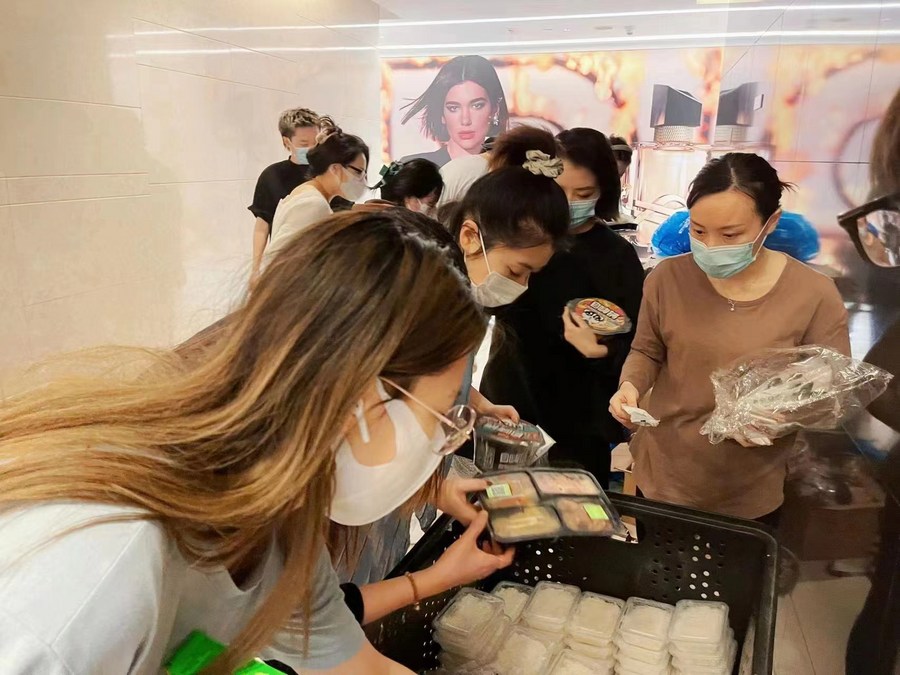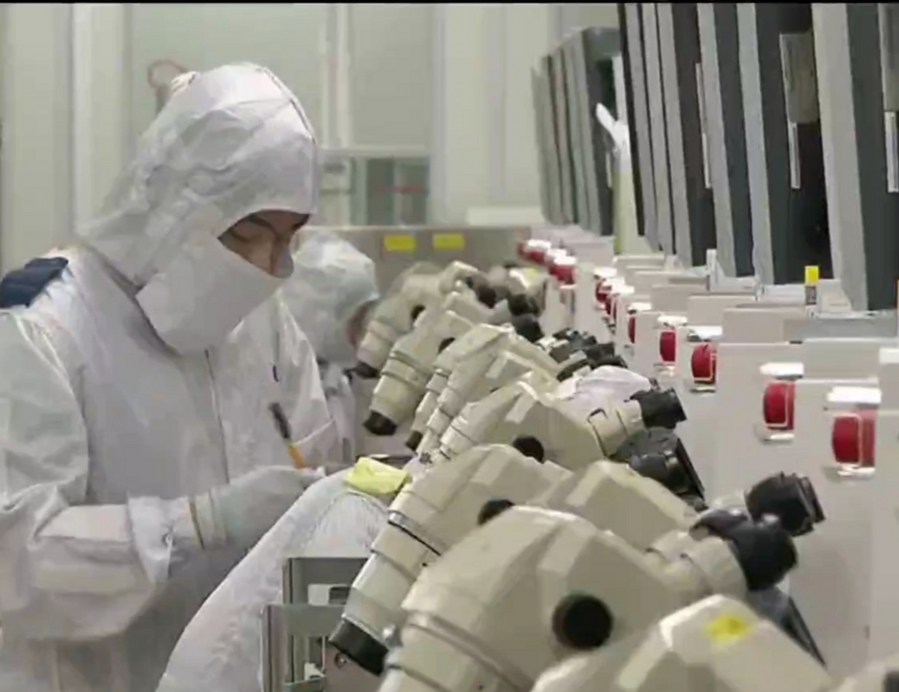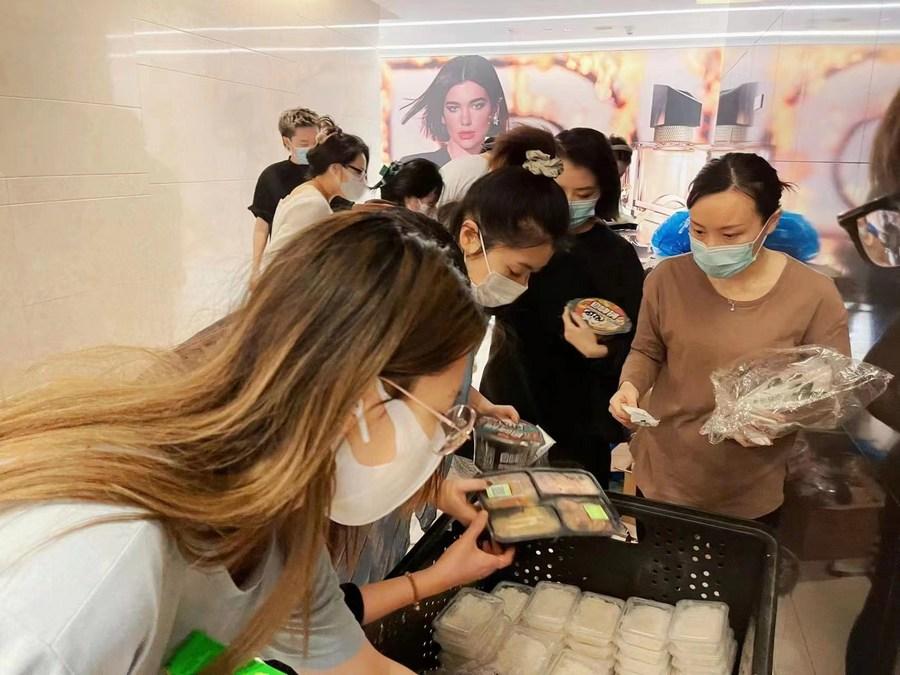* Though facing a new round of COVID-19 flare-ups and uncertainties in the global economic recovery, foreign enterprises have confidence in the Chinese market thanks to a slew of resolute, precise and comprehensive anti-epidemic measures.
* In Shanghai, where over 60,000 foreign-invested enterprises contribute about one-third of the city's tax revenue, a quarter of its GDP, and two-thirds of its foreign trade, promising investment prospects, high-level opening up and the favorable business environment have made the metropolis still an attractive destination for foreign investors.
* Coordinating epidemic prevention and control with economic and social development, Shanghai is making every effort to maintain normal operations, which has enabled factories, including those that are foreign-owned, to run smoothly, contributing to the global manufacturing industry.
By Xinhua writers Zhou Rui, Xu Xiaoqing and He Xinrong
SHANGHAI, March 22 (Xinhua) -- Though facing a new round of COVID-19 flare-ups and uncertainties in the global economic recovery, foreign enterprises have confidence in the Chinese market thanks to a slew of resolute, precise and comprehensive anti-epidemic measures.
In Shanghai, where over 60,000 foreign-invested enterprises contribute about one-third of the city's tax revenue, a quarter of its GDP, and two-thirds of its foreign trade, promising investment prospects, high-level opening up and the favorable business environment have made the metropolis still an attractive destination for foreign investors.
The city's actual foreign investment reached more than 2.37 billion U.S. dollars in January, up 26.6 percent year on year, and Shanghai also witnessed the establishment of 276 wholly foreign-owned enterprises in the month, according to the Shanghai Municipal Commission of Commerce.
STRONG GROWTH DESPITE EPIDEMIC
At 7 a.m. Tuesday, a stream of shuttle buses for commuting employees began to enter Tesla's Shanghai Gigafactory.
"Although we encountered a series of problems with inter-provincial transportation, procurement of anti-epidemic materials and staffing, production returned to normal with the help of the local authorities," said Tao Lin, vice president of Tesla.

Residents queue to receive COVID-19 nucleic acid tests at a residential area in Shanghai, March 21, 2022. (Xinhua/Fang Zhe)
Tesla's Shanghai factory exported 33,315 vehicles in February this year, up 339 percent year on year, maintaining its status as one of the U.S. electric carmaker's main export hubs.
Last year, the factory delivered more than 160,000 vehicles to overseas markets, meeting the needs of over 10 countries and regions in Europe and Asia.
"We are fully confident in the future development of the Chinese market," Tao said. "China has always been able to respond to the epidemic effectively while opening its doors firmly. It has become an important engine of global economic growth."
Coordinating epidemic prevention and control with economic and social development, Shanghai is making every effort to maintain normal operations, which has enabled factories, including those that are foreign-owned, to run smoothly, contributing to the global manufacturing industry.
To ensure the non-stop supply of cancer drugs amid the epidemic rebound, nearly 100 employees in a factory of Boehringer Ingelheim, a leading pharmaceutical company, have been living in the factory in Shanghai's Zhangjiang High-tech Park since March 16.
"Cancer drugs are very special, the production of which shall not be suspended," said Wang Bin, general manager of Boehringer Ingelheim Biopharmaceuticals China. "Since the recent resurgence, the whole company has been working together to guarantee the continued supply of anti-cancer medicines."
SWIFT, TARGETED CONTAINMENT
To curb the latest COVID-19 outbreak, Shanghai has carried out a series of swift, stringent and targeted measures including closed-off management in some areas.
"Our office in the Jing'an District was sealed for 48 hours, during which the efficient response of local authorities to the needs of enterprises was impressive," said Fabrice Megarbane, chief executive officer of L'Oreal China.

Employees receive boxed meal at the office of L'Oreal in Jing'an District of Shanghai, March 5, 2022. (Xinhua)
"It was late at night when the closed-off management came to an end. Thanks to the sufficient preparation of the local government, hundreds of taxis were waiting orderly outside our building to send home our employees safely," Megarbane said. "It fully reflected Shanghai's care for foreign-funded enterprises and the increasingly optimized business environment here."
According to the company, L'Oreal achieved double-digit growth on the Chinese mainland last year, growing at twice the industry average.
"We believe the difficulties are temporary, and we have great confidence in Shanghai," said Cao Chilun, president and country manager of Amkor Assembly & Test (Shanghai) Co., Ltd., a semiconductor company.
"Over the past weekend, the plant was temporarily put under closed-off management for 48 hours, but we continued to operate 24 hours a day during the period," Cao said.
According to Cao, their production plans have not been affected by the COVID-19 resurgence to date. "Shanghai's targeted containment measures have minimized the impact on companies."
Cao said there would be no change in the company's investment plans in China. "A new plant is under construction now, which is expected to go into operation in 2023 and increase the existing capacity by 45 percent."

Employees work on a production line of Amkor Assembly & Test (Shanghai) Co., Ltd in Shanghai, March 21, 2022. (Xinhua)
Aiming to further propel opening up, improve its business environment and provide more investment autonomy for foreign enterprises, Shanghai issued procedures to streamline the approval and filing of projects with foreign investment in January.
The procedures that apply to foreign investors, as well as projects newly established or acquired by foreign-invested enterprises involving fixed asset investment in the city, came into effect on March 1.
"Shanghai will continue to provide foreign enterprises with customized services and help them solve practical difficulties in a timely manner," said Gu Jun, director of the Shanghai Municipal Commission of Commerce.
(Xinhua correspondents Wu Yu and Wang Jingyuan also contributed to the story; Video reporter: Ding Ting; Video editors: Liu Xiaorui, Mu Xuyao, Zhao Xiaoqing)




 A single purchase
A single purchase









